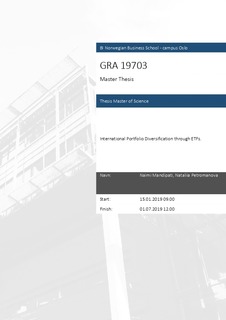International Portfolio Diversification through ETFs.
Master thesis
Permanent lenke
http://hdl.handle.net/11250/2626247Utgivelsesdato
2019Metadata
Vis full innførselSamlinger
- Master of Science [1621]
Sammendrag
We examine whether for a US investor, investing in 15 country equity index ETFs
traded on US exchange yields the same international diversification benefits as direct
investments in these countries’ equity markets. We document that the tracking errors
between the ETF’s NAV and market returns decrease with return horizons: they are large
and significant at the daily horizon and become negligible at an annual horizon. Across
countries, the tracking error magnitudes decrease as the overlap between the country’s
market trading hours and those of the US markets increase. These tracking errors lead to
substantial differences in the correlations estimated between the US markets and the
countries’ ETF NAV and returns respectively, with similar patterns as the tracking errors:
from large at the daily frequency to negligible at the quarterly frequency and decreasing
as the trading hours overlap increases. We find that the tracking difference between a
funds’ ETF return and NAV return is significantly related to the contemporaneous
S&P500 return, the Volatility index, and foreign exchange, which reflect US market news
or US investor sentiment, as well as fund specific variables such as Asset under
management, Volatility of the fund, and Relative Net Creations/Redemptions. The study
concludes that the tracking difference in the short-run arises primarily due to the
difference in trading hours and does not persist in the long run, and hence that ETF are as
efficient as direct investments to achieve international diversification.
Beskrivelse
Masteroppgave(MSc) in Master of Science in Finance - Handelshøyskolen BI, 2019
